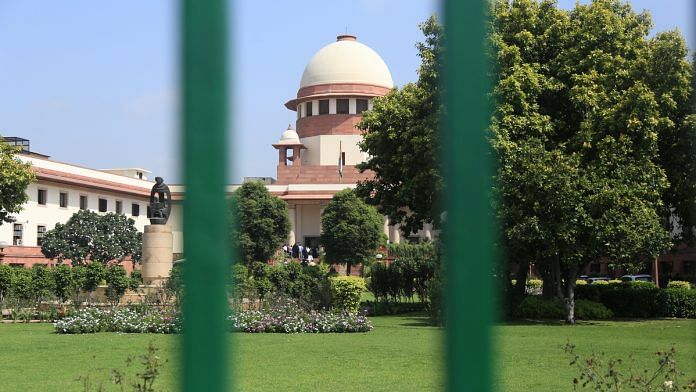New Delhi: The Supreme Court Thursday restrained the central government from taking coercive action against employers who have not complied with the home ministry’s 29 March notification to pay full salary to staff during lockdown.
The court reserved its order on a batch of petitions challenging the government order. A bench of Justices Ashok Bhushan, S.K. Kaul and M.R. Shah said it would pronounce verdict on 12 June.
During the hour-long hearing, held via video conference, the bench said the government must strike a balance between workers and employers because the Covid-19 lockdown has impacted both.
“The government can play the role of a facilitator. Negotiations can be done industry-wise. It may not be possible for employers to pay 100 per cent. There should be a practical solution,” the bench observed.
On its part, the government said its notification was meant to stop workers from “migrating”.
“People were migrating in crores. The notification was to stop the workers, which they would if they are paid,” said Attorney General K.K. Venugopal.
While employers had challenged the central government’s power to issue such a notification — with service agreements governed under the Industrial Disputes Act — the counsel appearing for workers said the government was within its right to issue such an order.
It was pointed out by the bench that the government had not invoked the provisions of the Industrial Disputes Act while issuing the notification. Justice Kaul quoted the law to say: “Under the Act, workmen who are laid off are entitled to 50 per cent of total wages as compensation. But you (MHA) directed 100 per cent.”
Venugopal cited the Disaster Management Act to argue that a National Executive Committee (NEC) can bring out such an order and has to ensure its compliance.
The court was urged not to intervene in the matter in view of the substantial public interest involved.
Also read: If Modi govt had followed this 2018 SC order, migrants wouldn’t have had to flee the cities
‘Order wasn’t permanent, has been withdrawn’
The central government had Wednesday filed a written response to the petitions challenging its 29 March order on compulsory wage payment and said the notification was never a permanent measure and has been withdrawn.
The government clarified that the order was retracted after inputs received from experts to resume commercial operations, so that the burden to pay workers without operations is mitigated.
The government’s affidavit further states that employers will now have to pay for 54 days, the period when the order was in operation. It also asks the top court to direct companies, citing financial inability, to place on record their audited account books.
During the hearing, Venugopal also said wage payment was a matter between employers and their staff.
Workers followed lockdown orders, can’t be denied wages
Senior advocates, who intervened on behalf of workers, argued that no-work-no-pay principle cannot be applied during the lockdown period. Advocate Indira Jaising said workers did not want to defy the lockdown orders, they were willing to work but were unable due to the restrictions.
“Who is the affected community? They (migrants) are those who were prevented from eating with no roof on their head. Ask them (employers) about their financial liability,” she said.
Senior advocate C.U. Singh also argued on behalf of a workers’ organisation and said: “If they have means, why should Supreme Court under Article 32 be called upon to interfere? As of now no prosecution has been initiated against any employer.”
The senior lawyers opposed the court’s suggestion to use Employees State Insurance (ESI) funds to help workers and insisted that it cannot be redirected.
Also read: SC can’t ‘monitor’ walking migrants, but 12 HCs have issued orders on food and shelter
Notification compels companies to pay full wage: SC
When the petitioners requested for the notification to not be mandatory in nature and restrict it to being an advisory, the Supreme Court wondered if the government could compel employers to pay.
“Your notification compelled the payment of 100 per cent of salaries…it can be around 50 to 75 per cent. So, the question is, do you have the power to get them to pay 100 per cent, and on their failure to do so, prosecute them?” Justice Bhushan asked Venugopal.
Venugopal asked the bench to consider the situation on humanitarian grounds, the purpose for which the notification was brought in.
At this, the bench suggested the employers to negotiate with their employees but the firms responded by saying that the notification disallowed such settlement talks.
“The order threatens prosecution, making it hard for us to get them (workers) to a conciliation,” said senior advocate K.V. Vishwanathan, appearing for a firm.
“You tell us, can you run an industry without labour? Therefore, you have to strike a balance and this should not be tilted either on the side of the employer or the employee,” remarked Justice Shah.
Also read: ‘How long will people sustain?’ SC issues notice on plea against media layoffs



